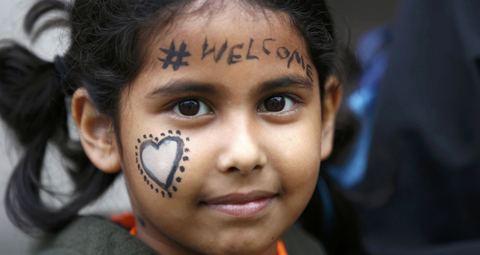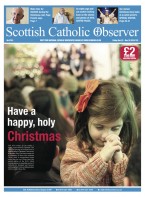BY Daniel Harkins | September 23 2016 | ![]() 0 COMMENTS
0 COMMENTS ![]() print
print

Scots Catholics join Pope in call to help refugees
Publication Date: 2016-09-23
Welcome refugees into your homes, Pope says, as Scots give their support
Scotland’s Catholics have been asked to back a call by Pope Francis to do more to help refugees and migrants.
As a UN Summit on migrants got underway in New York on Monday—and Pope Francis called on the world to do more to help those fleeing terror and poverty—the Scottish Church, priests, and Catholic teachers have stressed the importance of seeing refugees with humanity and dignity.
Speaking on September 19 to the alumni of European Jesuit schools, Pope Francis said that ‘each refugee is not just a number, but a person with a name, a face, a story.’
“I encourage you therefore to welcome the refugees into your homes and communities, so that their first experience of Europe is not so traumatic as to sleep in the cold in the streets, but that of warmth and humanity.”
In a week in which a Kenyan-born ethnic Somali was charged with stabbing nine people in an attack in the United States, and an Afghanistan-born US citizen was accused of planting bombs in New York state, the Pope stressed that ‘authentic hospitality’ is our ‘greatest security against the hateful acts of terrorism.’
Scottish support
Archbishop Philip Tartaglia, president of the Bishops’ Conference of Scotland, wrote last September to First Minister Nicola Sturgeon, placing parish resources in Scotland at the service of refugees fleeing Syria and other parts of the world.
“Today, the Church in Scotland continues to work in partnership with local government and faith communities to offer support and assistance to refugees as they arrive in Scotland seeking sanctuary and understanding,” he said. “As Pope Francis renews his call on us to welcome refugees into our homes and communities, we are reminded of our obligation to offer solidarity and hope, in Matthew’s Gospel 25-35: ‘…For I was hungry and you gave me something to eat, I was thirsty and you gave me something to drink, I was a stranger and you invited me in.’
On Thursday September 15, Our Lady of Good Aid Cathedral in Motherwell held a Mass for refugees. Fr Martin Delaney, assistant priest in the parish and Motherwell youth chaplain, concelebrated alongside Bishop Joseph Toal, and he said the parish, the diocesan schools and youth, are hoping to do more to help refugees.
“We are showing support and raising awareness but we want to start reaching out as well,” he said. “As a community we have to be much more pro-active in welcoming people. You have to recognise people beyond the label of a refugee; recognise the shared humanity and values, and break down barriers that separate people. Meeting and understanding refugees can help us move on from ignorance.”
Scotland’s Catholic schools have been at the forefront of welcoming refugees, from Syria in particular, to Scotland. St Ambrose High in Coatbridge last year welcomed a group of Syrians to St Augustine’s parish, and pupils decorated the homes of the new arrivals for Christmas.
In Clydebank, St Peter the Apostle pupils put together hampers of gifts and supplies for the Syrians in the council area. Pauline Barr, principal teacher of RE at the school, said pupils recognise the hardship facing refugees and understand the complexities beyond the media stereotype of migrants. “They recognise what it would be like to be forced from your home,” she said. “They recognised how fortunate they are in comparison.”
“Scotland is a country of diverse nationalities and we welcome and should be welcoming to everybody,” she added. “We have an obligation to help and support people who are less fortunate than us—the main principle of Catholic social teaching is recognising the dignity and value of every human being, and that doesn’t stipulate where the human being came from.”
One talking point addressed by the pupils during their visit was the fact the refugees had iPhones, something some media outlets had previously highlighted in critical articles. But Mrs Barr said the pupils realised that the refugees only months before had homes, jobs and family meals—“imagine all you were left with was your iPhone and the clothes you had on,” she said.
International parish
One Scottish parish that has experienced firsthand the effects of large-scale immigration is the Immaculate Conception parish in Maryhill.
The area has housed many refugees and immigrants and the parish congregation has 24 different nationalities. But parish priest Fr Jim Lawlor said the refugees are decent, faithful people.
The parish held a campaign where parishioners wore safety pins to show support for refugees, with 400 safety pins distributed amongst parishioners.
“Its only maybe at a church that the issue comes up into peoples consciousness, because you maybe aren’t living next door to a refugee. But at church you see them looking for a bit of friendship and support,” he said. “They are looking to belong.”
Fr Lawlor said he has not yet met a refugee who is not grateful and open to contributing. “All I have experienced is a positive enrichment,” he said. “They are just human beings! They are the same as us, especially if we share the same faith—we have a moral obligation to go looking for them.”
“I think all the right things are being said but we need to change hearts so that we start doing the right things as well,” he added.
On Saturday, tens of thousands joined a march in London calling on the government to do more to help refugees. An ecumenical service of prayer for refugees was held beforehand at St James, Westminster.
UK Prime Minister Theresa May addressed the UN migrant summit on Monday September 19, calling for a distinction to be made between refugees and economic migrants.
—This story ran in full in the September 23 edition print of the SCO, available in parishes.











